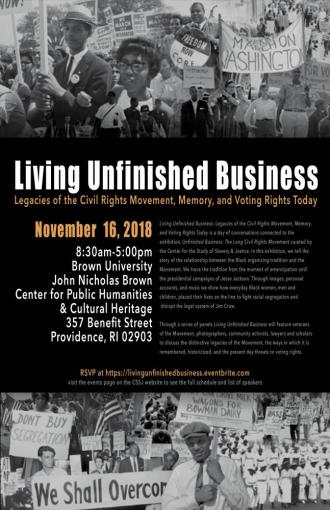John Nicholas Brown Center
357 Benefit Street
Providence, RI, 02912
First Floor Seminar Room
Living Unfinished Business: the Legacies of the Civil Rights Movement, Memory, and Voting Rights Today is a day of conversations connected to the exhibition, Unfinished Business: The Long Civil Rights Movement curated by the Center for the Study of Slavery & Justice. In this exhibition, we tell the story of the relationship between the Black organizing tradition and the Movement. We trace the tradition from the moment of emancipation until the presidential campaigns of Jesse Jackson. Through images, personal accounts, and music we show how everyday Black women, men and children, placed their lives on the line to fight racial segregation and disrupt the legal system of Jim Crow.
Through a series of panels, Living Unfinished Business will feature veterans of the Movement, photographers, community activists, lawyers and scholars to discuss the distinctive legacies of the Movement, the ways in which it is remembered and the present day threats to voting rights.
Register on Eventbrite

Program
8:30 am - Opening remarks, Prof. Anthony Bogues, Director
9:00-10:30 - Documenting and Remembering the Movement
- LeRoy Henderson
- Stephen Shames
- Sylviane Diouf
- Shana Weinberg, Chair
Photographers during the 1960s captured the mass mobilization efforts of various Civil Rights organizations, giving face to the Black women, men, and children who participated in marches, sit-ins, protests, boycotts, and voter registration drives. They helped to document the violence and threats to individuals who participated in the fight against white supremacy. By helping to capture the activities of the Southern Freedom Movement, they educated the American public about the realities of life for African Americans under Jim Crow. They created works that fed a vibrant Black press and sometimes made its way into popular media outlets. Today these striking works are both artistic and historic documentation that give viewers glimpses into the personal experiences of the Movement. This panel will bring together photographers of the Movement to discuss their work as well as contemporary efforts to interpret these images to help viewers understand this past.
10:45-12:15 - “One Man, One Vote”: Voting Rights Then and Now
- Malcolm Farmer
- Nse Ufot
- Jordan Camp
- Françoise Hamlin, Chair
Black voter registration was a central aim of the Southern Freedom Movement. Local white leaders across the South used a variety of tactics to limit Black participation in the political process. These tactics included poll taxes and literacy tests as well as violence and harassment. This panel explores the mobilization efforts of the 1960s. The passage of the Voting Rights Act would not have been possible without the work of organizations such as Congress of Racial Equality (CORE), Student Nonviolent Coordinating Committee (SNCC), Southern Christian Leadership Conference (SCLC) and the Lawyers Constitutional Defense Committee. As the Voting Rights Act is increasingly under attack, this panel will examine the necessary work required to mobilize unregistered African American voters. The panel will also examine the racialization of voting rights policies today and how it continues to disenfranchise different communities of color.
12:15-12:45 - Lunch
1:00-2:30 PM -Student Nonviolent Coordinating Committee (SNCC) Roundtable
- Judy Richardson
- Courtland Cox
- Geri Augusto
- Maiyah Gamble-Rivers, Chair
The Student Nonviolent Coordinating Committee (SNCC) formed in 1960 and was the only group completely led by young people. Mentored by Ms. Ella Baker, SNCC members committed themselves full time to bottom-up grassroots organizing in order to radically transform American democracy. In this panel SNCC veterans speak about their experiences in the Movement as well as their continued work to archive, preserve, and share this history. To learn more about SNCC members and their work, please visit the SNCC Digital Gateway.
2:30-3:30 - Walk through of exhibition Unfinished Business: The Long Civil Rights Movement
3:30-5:00 - Reception at the Center for the Study of Slavery and Justice
Center for the Study of Slavery and Justice
94 Waterman St.
Providence, RI 02912
Enjoy a special reception at the Center’s 19th-century house. View the exhibition currently on display in the gallery, Herstory, by 2018 Heimark Artist-in-Residence Jessica Hill, which includes the stunning glass wall-art piece, Rising to Freedom, and a symbolic slave garden. Herstory examines the resilience of black women throughout history while referencing folktales created through the Middle Passage and the communities formed by enslaved people in the New World.